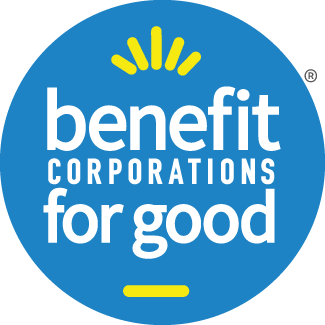Now Even Investment Firm BlackRock Favors the Philosophy of Benefit Corporations
Photo by Ross Findon
The movement is growing. It started as a grassroots effort with small and mid-size companies, but this business model of contributing to the greater good is catching on with more influential supporters including, yes, Corporate America.
Last week, a New York Times article reported that “Laurence D. Fink, founder and chief executive of the investment firm BlackRock, is going to inform business leaders that their companies need to do more than make profits — they need to contribute to society as well if they want to receive the support and backing of BlackRock.”
Yes, you read that correctly.
The largest investor in the world with more than $6 trillion in investments is telling business to serve a higher purpose than just profits. “Society is demanding that companies, both public and private, serve a social purpose,” he writes in a draft of a letter going out the world’s largest public companies. “To prosper over time, every company must not only deliver financial performance, but also show how it makes a positive contribution to society.”
Which brings us to the related subject of this post: The Benefit Corporation.
Because the premise of this progressive business model is fundamentally based on the “Triple Bottom Line” or “3 P’s” coined by British consultant John Elkington in 1994. He argued that companies should be preparing for not one but three bottom lines as we quote him in our new book “Putting Soul Into Business, a book that reinforces the words of BlackRock’s CEO.
The first P is the measure of Profit. The second, People, is the measure of how socially responsible a business is to customers, the community and employees. And the third, Planet, measures how environmentally responsible the business is.
We think Mr. Fink would embrace these kind of metrics when evaluating a company’s contributions to society.
Put simply, the Benefit Corporation raises the bar for a business seeking to make social and environmental impact.
And let’s be clear.
It isn’t only BlackRock issuing the mandate for business to be more socially responsible. A new generation of consumers is demanding it.
According to a 2015 Cone Communications Millennial CSR Study, “more than 9-in-10 Millennials would switch brands to one associated with a cause,” and Millennials are “prepared to make personal sacrifices to make an impact on issues they care about, whether that’s paying more for a product, sharing products rather than buying, or taking a pay cut to work for a responsible company.”
The good news is that the Benefit Corporation is now an option as a legal structure in 34 states and counting. It’s only a matter of time before it is available in all 50 states.
That’s right. The business torch to serve a greater purpose is available now.
If you’re interested in learning more about the “why” and the “how” of this new paradigm, our new book provides some answers.
It’s not only something the CEO of the largest investment firm in the world embraces. It’s something that your employees, customers and community would celebrate as well.
—>Learn more about the 6 simple steps to becoming a certified Oregon Benefit Company or benefit corporation.
~benefitcorporationsforgood.com~

